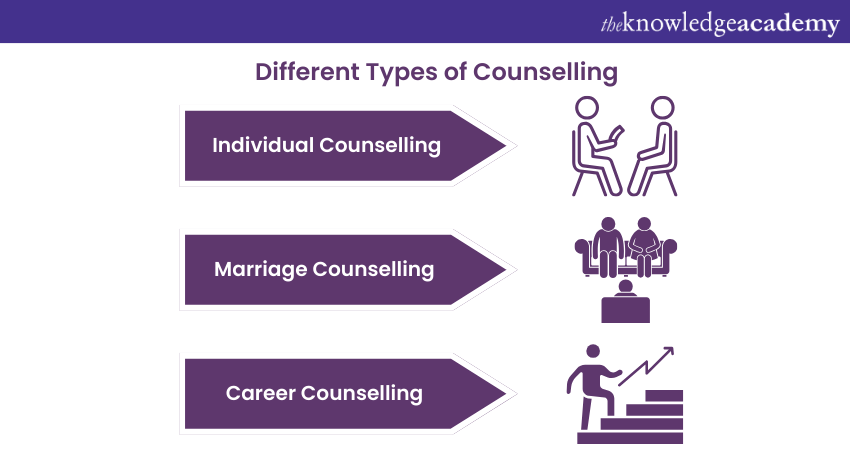A Comprehensive Guide to the Different Types of Therapy and Their Influence
Counseling encompasses a range of healing strategies, each developed to fulfill special mental wellness needs. From the organized strategies of Cognitive-Behavioral Treatment to the compassionate nature of Person-Centered Therapy, these modalities provide distinctive paths to personal growth. Family therapy and Dialectical Behavior modification provide extra structures for recovery, while team counseling promotes community support. Understanding these diverse methods can illuminate their profound effect on individual well-being. What remains to be discovered are the details of each strategy.

Recognizing Cognitive-Behavioral Therapy (CBT)
Although many therapeutic techniques exist, Cognitive-Behavioral Therapy (CBT) attracts attention due to its structured, goal-oriented nature. This kind of therapy is based on the property that thoughts, sensations, and actions are adjoined, and by changing negative thought patterns, individuals can alter their emotional actions and activities. CBT utilizes various techniques, such as cognitive restructuring, which helps clients determine and challenge distorted beliefs. Behavioral activation encourages engagement in pleasant activities to fight anxiety.
Commonly, CBT is a temporary therapy, usually long-term in between 12 to 20 sessions, making it accessible for those looking for fast outcomes. Its efficiency has actually been well-documented in dealing with anxiety conditions, depression, and various other psychological health and wellness problems. The therapist's role is to lead customers via exercises and homework assignments, fostering self-awareness and advertising long-term coping methods. This functional method empowers people to take control of their psychological well-being, ultimately bring about boosted life fulfillment.
Checking Out Person-Centered Therapy
Person-Centered Therapy, established by Carl Rogers, supplies a different technique to Cognitive-Behavioral Therapy by emphasizing the customer's subjective experience. This healing design prioritizes the person's viewpoint, cultivating an atmosphere of compassion, genuine positive regard, and authenticity. By enabling customers to explore their feelings and ideas without judgment, therapists assist in individual growth and self-discovery.
The core tenet of Person-Centered Treatment is the idea that individuals possess the intrinsic capacity for self-healing and personal growth. In this setting, the therapist works as an encouraging overview instead of a directive authority, urging clients to organize their very own journey. This strategy is especially effective for those coming to grips with concerns such as low self-confidence, anxiousness, or depression, as it equips them to challenge and understand their feelings. Eventually, Person-Centered Therapy grows a strong restorative partnership, cultivating count on and openness vital for purposeful change.
The Function of Family Members Treatment in Healing
Household treatment offers as a crucial part in the healing procedure for people and their relationships. This restorative technique concentrates on boosting communication, solving problems, and cultivating deeper connections amongst member of the family. By addressing dysfunctional dynamics, household therapy motivates each participant to reveal their ideas and feelings in a risk-free environment, promoting understanding and empathy.

The effect of family members treatment extends beyond the sessions, as enhanced connections can bring about enhanced emotional health for all involved. In general, household treatment plays an essential duty in healing by fostering unity, resilience, and mutual support among family members, ultimately guiding them toward a healthier, much more satisfying life together.
Unloading Dialectical Behavior Modification (DBT)
Building on the foundation of therapeutic methods that improve emotional health, Dialectical Behavior modification (DBT) supplies an organized structure for people fighting with extreme feelings and behavioral difficulties. Established by Marsha Linehan, DBT integrates cognitive-behavioral techniques with mindfulness practices, intending to assist clients handle overwhelming feelings and improve social performance.
The treatment is especially useful for those detected with Borderline Individuality Problem but is also applicable to an array of various other mental health concerns. relationship therapy. DBT contains specific treatment sessions and skills training teams, concentrating on 4 crucial ability collections: mindfulness, distress tolerance, emotion policy, and interpersonal effectiveness
The Benefits of Group Therapy Sessions
While individual treatment gives beneficial insights, group therapy sessions use one-of-a-kind advantages that can substantially boost the restorative experience. One vital advantage is the feeling of neighborhood that arises among participants. People typically locate comfort in sharing their experiences with others dealing with comparable challenges, fostering an encouraging setting that minimizes sensations of seclusion.
Team sessions encourage varied perspectives, permitting individuals to learn from each various other's coping techniques and insights. This cumulative wisdom can bring about improved problem-solving capacities and a wider understanding of personal problems.
Additionally, team counseling usually promotes accountability, as participants encourage each other to seek their goals and adhere to their commitments. The cost-effectiveness of group therapy makes it an accessible alternative for many people looking for assistance. Overall, the collaborative nature of group counseling sessions can significantly enhance the restorative trip.
Often Asked Inquiries
What Qualifications Do Therapists Required to Exercise Therapy?
Specialists commonly need an appropriate level in psychology or counseling, together with supervised medical experience. Furthermore, they should obtain suitable licensure or certification to practice legally, ensuring adherence to specialist standards and moral standards.
Exactly how Do I Select the Right Sort Of Therapy for Me?
Selecting the appropriate sort of therapy involves evaluating individual demands, checking out different strategies, taking into consideration therapist specialties, and seeking recommendations. Recognizing private goals and choices can considerably improve the effectiveness and contentment of the therapeutic experience.

Are Online Counseling Sessions as Effective as In-Person Ones?
The efficiency of on useful link the internet counseling sessions compared to in-person ones commonly depends upon specific preferences and scenarios. Research study suggests that both techniques can generate favorable outcomes, though some might find better convenience in face-to-face wikipedia reference communications.
How Much Time Does Counseling Commonly Last?

What Should I Anticipate Throughout My Initial Therapy Session?
Throughout the first therapy session, clients can expect an intro, discussion of their issues, establishment of goals, and a review of the therapy process - virtual therapy. This initial meeting aims to construct connection and assurance convenience